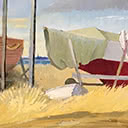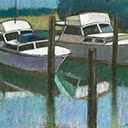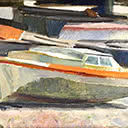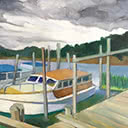On the Hard
31 x 100 cm
est. $2,000 - 3,000
Ron Stenberg has had a long and distinguished career as an artist, teacher and illustrator. Born in Auckland in July 1919, Stenberg initially studied painting as a young teenager in the early 1930's. The depression took its toll on his family and he left art school and started work as an illustrator a couple of years later. Over the next twenty years, while working as an illustrator and later in advertising, Stenberg established himself as an artist in New Zealand through exhibiting in group exhibitions at the Auckland Society of Arts. In 1954 a Carnegie scholarship enabled him to travel overseas for two years. A few years later he was offered a teaching position at the Duncan of Jordanstone College of Art in Dundee, Scotland; he remained there for almost thirty years retiring as Professor of Painting in 1984. He returned to Auckland in 1990.
Whilst living in Scotland Stenberg seldom exhibited in New Zealand and is therefore less well known here, than he deserves to be. He was, however, a frequent exhibitor with the Royal Scottish Academy, the Royal Scottish Watercolour Society, the Glascow Institute and the Royal Society of British Artists and participated in many group and solo exhibitions in Britain, Sweden and other European countries. His work is held in many private and public collections both here and overseas. The Auckland City Art Gallery, Te Papa, the Bishop Suter Gallery in Nelson and the National Gallery of Victoria, Melbourne all hold his work.
When Ron Stenberg first commenced his studies at the Elam School of Fine Arts in the early 1930s, modernism was a relatively new art movement to New Zealand. Known to artists largely through black and white illustrations in art periodicals and magazines, it was not to make a significant impact on the local art scene until at least a decade later. Although familiar with the new ideas, Stenberg's principal tutors at Elam, Archie Fisher and John Weeks, were academic in their approach to painting. Their teaching emphasised the formal aspects of art making - texture, colour and form. It was an approach that Stenberg could empathise with.
While an understanding of modernist attitudes underpins the works in this exhibition, their very painterliness and the control evident in Stenberg's use of line, tone and volume are indicative of the disciplined approach of Stenberg's initial training. His subject matter is, in many ways, traditional. It is also, to a great extent, autobiographical: portraits, still life, villages and farm scenes, boat yards. People, places and objects with a personal connection to the artist. His work sits well within both a New Zealand and a Scottish painting tradition.





